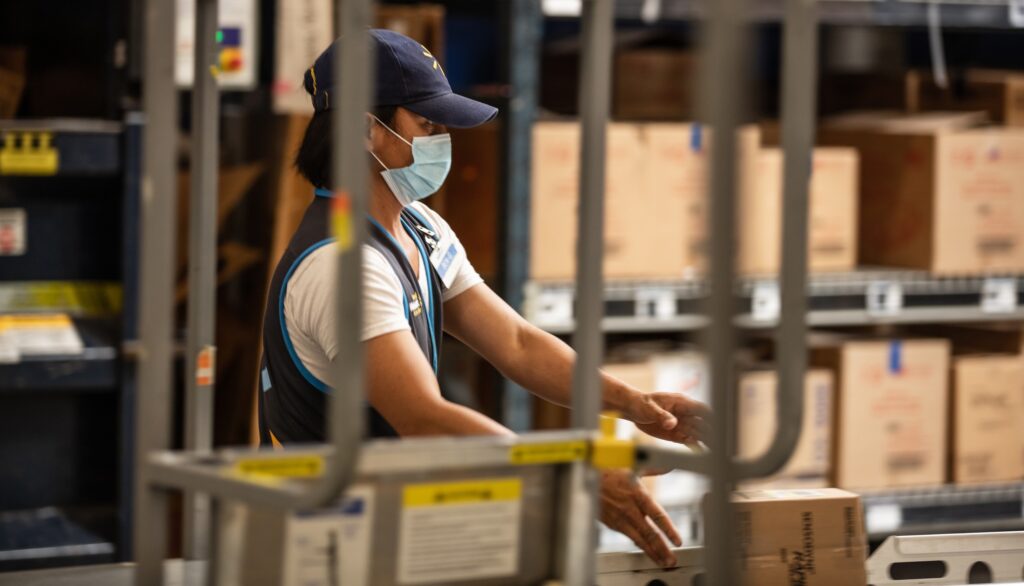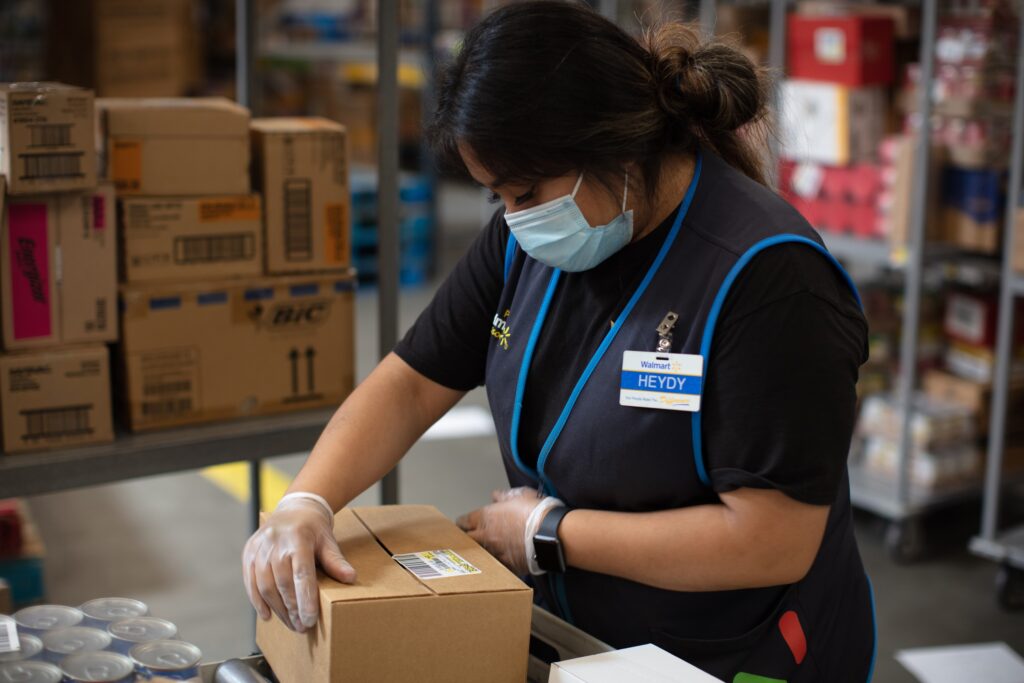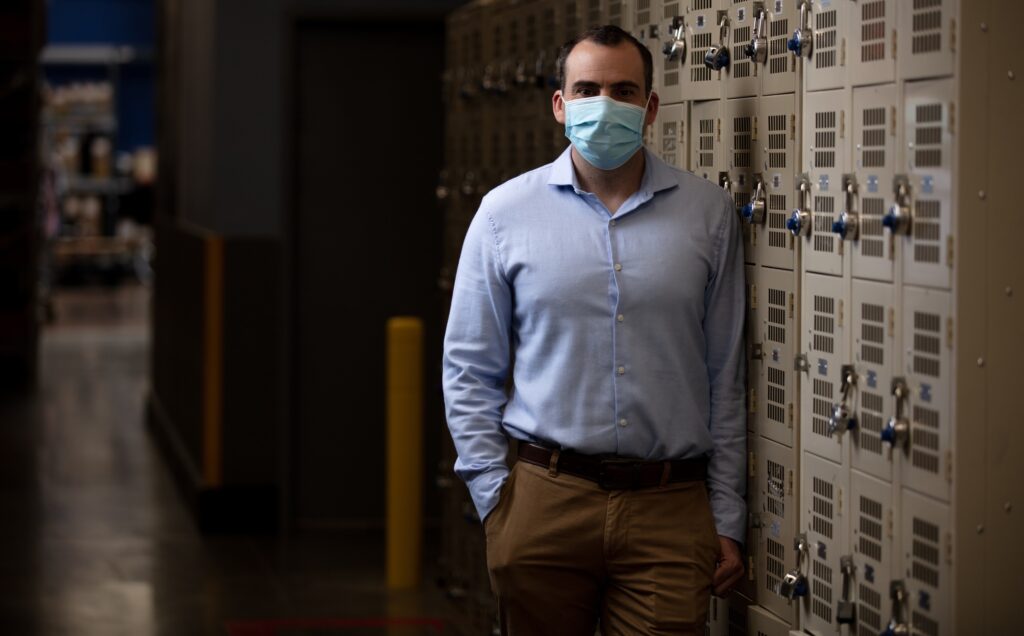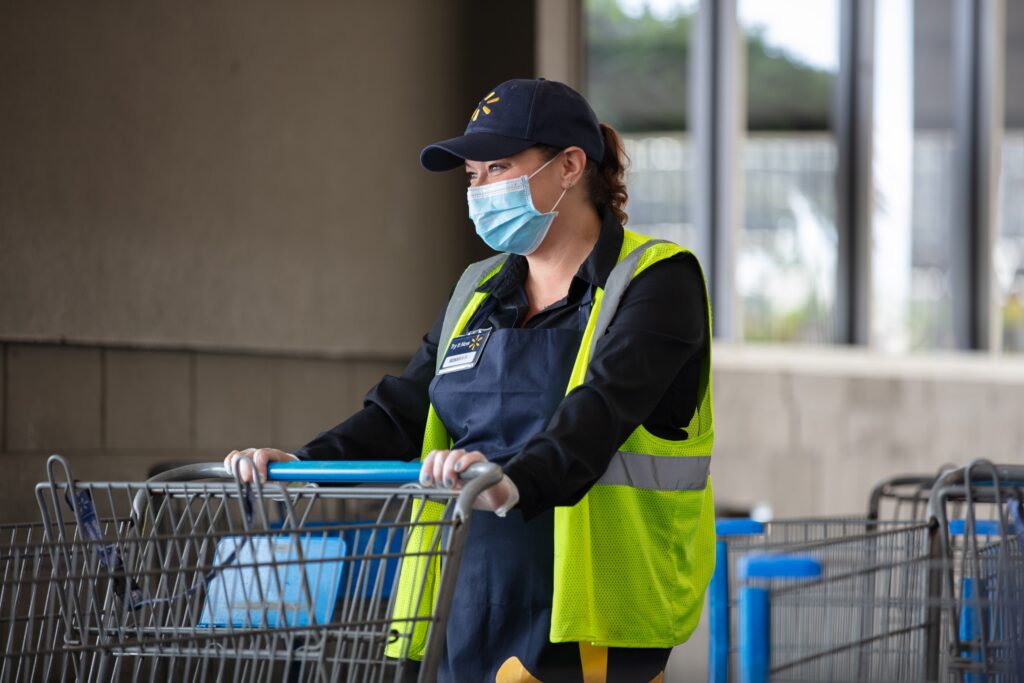July 27, 2020
By Kane Webb, Walmart Corporate Affairs
A couple of years ago, Josh Christiansen left Walmart to pursue a career in a different field. But when the former associate heard that Walmart store 4677 in Muskego, Wisconsin, was hiring workers during the pandemic, he reapplied for a temporary position. He also kept his full-time job.
Christiansen returned to Walmart in late March, and, according to his supervisors, is a “rock star unloading trucks and stocking chemicals.”
So, why did he add the temp position at Walmart to his full-time job? As it turns out, Christiansen has been donating his Walmart paychecks to charity, Brittany’s Hope Foundation, which provides comfort and support for young adults fighting cancer, and the Midwest Athletes Against Childhood Cancer (MACC) Fund. He’s also donated money to another former Walmart associate whose mother passed away recently.
When he was asked why he was doing all this, Christiansen responded, “No real reason. Just thought it was a cool thing to do.” He continues to work both jobs.
In suburban Chicago, Sue Cole was working as a visual merchandising manager at a department store when the pandemic hit the Second City with devastating effect. Furloughed from her job in March, and with her homebound mother to tend to, Cole faced two major life stresses: finding work and taking care of a parent.
She heard from a friend on the East Coast that Walmart was hiring. “I had no real opinion about Walmart,” she said. “But I needed a job, so I drove out to a store and applied.”
In short order, Cole was hired at store 5352 in Batavia, Illinois, as part of a new overnight Dry Stock team with a schedule flexible enough for family. Three months later, she wrote this letter to fellow associates in the Home Office: “Hello! I would like to take this opportunity to thank everyone for helping me through this temporary shutdown of our country due to the COVID-19 pandemic. … I love this company’s thankfulness and attitude of gratitude.” She thanked the store’s People Lead, Louie Churnovic, for working with her on a schedule that allowed time for her to care for her mom. She praised her overnight supervisors, Rob McCarthy and Chantas King, for their leadership and work ethic. She closed by writing that she would “remain a lifetime customer” at Walmart. It sounded like a farewell. And, sure enough, Cole’s old job at her former employer had come back open.
But … “I found I really liked the culture and the people,” she said over the phone, “and I wanted to stay.” So, she did both. Cole returned to her previous full-time job, and she also remains a key member of the overnight Dry Stock team one day a week.

One more. Devin Kennedy was another sudden victim of the health-turned-economic crisis when his job in a tech company warehouse disappeared seemingly overnight. Kennedy, who served in the U.S. Army for six years and is currently a reservist, joined Walmart store 3266 in East Windsor, New Jersey, as a maintenance supervisor. It’s been another natural fit.
These three associates are among the tens of thousands hired over the past three months, since Walmart announced plans to add 150,000 workers during the pandemic for two very important reasons: Walmart needed the associates, especially given the customer rush on essentials as lockdowns spread across the U.S.; and more and more Americans needed the work. And fast.
That initial goal to hire 150,000 new, mostly temporary associates soon rose to 200,000, then 250,000. As of mid-July, Walmart has hired more than 400,000 new associates, split almost evenly between men and women and representing practically every demographic. One thing almost all of them have in common, however, is why they joined: the historic, lightning-quick impact of COVID-19 on businesses across the country.

According to Donna Morris, Walmart’s chief people officer, most of the new hires are being filled temporarily, often as a bridge between jobs for workers in heavy hit industries such as tourism and travel, hospitality, restaurants and retail.
“We really have been supporting Americans during this period of time by providing them that bridge,” Morris said. “We’re proud of the role that they’re playing in our communities, and we’re leaning into ways to support their emotional and physical wellbeing. We will do everything that we can to safeguard the wellbeing of all our associates. These new hires also supported these efforts by allowing us to give time off to associates who needed the break.”

The story behind the story here is the sprint to expedite the hiring process, which previously could take up to three weeks from application to first day on the job. Some preliminary work was already in motion to smooth out and speed up hiring, but the crisis escalated things considerably. Once the decision came to hire thousands of new workers, said Drew Holler, senior vice president of associate experience and operations, it took only two weeks for team members to create a more streamlined hiring process.
Holler and Julie Murphy, executive vice president and chief people officer for Walmart U.S., corralled associates with expertise in technology, people and other business operations to mastermind the changes.
“We removed red tape from the team so they could go fast,” Holler said. “And we ultimately made it smoother for the candidates.”

“Looking at the analytics, we knew we were losing candidates because it took so long on the front end,” said Murphy, who recently celebrated her 35th year with Walmart. “Our challenge was to reduce that time significantly, to release some of the rigidity in the process. Connect quickly and get started. Once associates get in a store or fulfillment center and start to bond, they really start to see Walmart.”
Over those initial two weeks, the team isolated and eliminated friction points, such as the number of “clicks” required to apply online and transitioning from in-person to interviews over the phone. Orientation was streamlined from eight hours to two.
They called it Project 24 – with a goal of getting from job opening to job accepted within 24 hours. “The idea was that we could do same-day hiring if everything went smoothly,” said Becky Sadler, a hiring product leader and eight-year Walmart associate.
Looking over the data from the previous hiring process, Sadler and the team saw that a lot of time was spent setting up in-person interviews. Messages back and forth, scheduling and re-scheduling. The pre-employment assessment combined with a thorough phone interview would work as well and save time.
In addition, Walmart had in place something called a “constant application flow” for jobs, which provides a ready database of candidates who have already applied and indicated their preferences for hours and positions.
“So, as soon as you tell the system, ‘hey, I need a cashier,’ you’ll instantly have a list of possible candidates,” Sadler said. “So, there’s no wait. It’s unique to Walmart, and that’s something that is probably the most critical piece of 24-hour hiring.”
The team conducted webinar training calls via Zoom with leaders in the field, and, with the new process in place, hiring sped up almost instantly. What once took weeks is now down to days and, in some cases, hours. And the average time it takes from identifying a hiring need to making an offer has dropped from 14.5 days to three-and-a-half.
They’re not done yet.

“We’re looking at how we can remove even more friction,” Holler said.
“In terms of meeting business needs, it was 100 percent the right thing to do,” Morris said. “And in terms of helping people, we were 100 percent right.”
Echoes of the company’s response when Hurricane Katrina ravaged New Orleans and the Gulf Coast: Do what’s right first – and fast.
Over the long run, it’s always a sound strategy. In the case of the expedited hiring process, short-term benefits are in play, too. “This was going to launch several months from now,” Morris said. “Now we’re doing it, and we’re not going back.”
There was another accelerant as the crisis began to strangle the economy: companies helping companies to help workers. Through a business-to-business platform called People + Connect, companies forced to furlough workers connected with companies that had opportunities. Walmart was among the first adopters of the platform.
To put a quarter-million new hires into perspective, consider this from Harvard economics professor Rebecca Henderson, author of the new book Reimagining Capitalism In A World On Fire: “That’s only slightly less than the entire economy created in February 2020, right before the pandemic hit. Let’s hope they are sharing all they are learning on how to do this with other firms that are looking to grow employment!”
If there’s a postscript to this story, it’s a familiar one: Our people make a difference. For a month, for a career, for a lifetime. “A lot of these people have decided to stay on fulltime, taking supervisory roles, thinking about making Walmart a career,” said William Roberts, a store manager in Lakewood, Colorado, who adds that he’s hired more than 90 new associates since the pandemic began, many from the hospitality industry. Two of the new hires have been promoted to department managers. “It’s because of the relationships we have with people, and the way we take care of people,” he said. “Even in three to four weeks, some people have decided to stay.”
Maybe it’s as simple as feeling as if you’ve found a home, a connection. Walmart president and CEO Doug McMillon tells a story about a store visit in which he met a 25-year associate and a new hire working side-by-side in the toy department. It was evident they had already formed a relationship.
Who knows? The new associate may go back to his previous job, but the relationship can remain – and leave a lasting impression. That’s a win, too.
A now-former associate at a store in Chandler, Arizona, recently returned to her former line of work, bridged from “then” to “now” thanks to a timely stint at Walmart. In a letter proffering her two weeks’ notice, she wrote:
“It has been a pleasure to train and work for Walmart for the short length of time I have been there. I appreciate the level of commitment to the training and professionalism that the company has taught me. It has been an asset in helping me develop my skills as a customer service representative that can be used in many employment opportunities.”
As this pandemic has reminded us, we’re all passing through, looking to help and, on occasion, needing to be helped. And in the end, the goal is simple, really: We hope to make a difference.
Source: